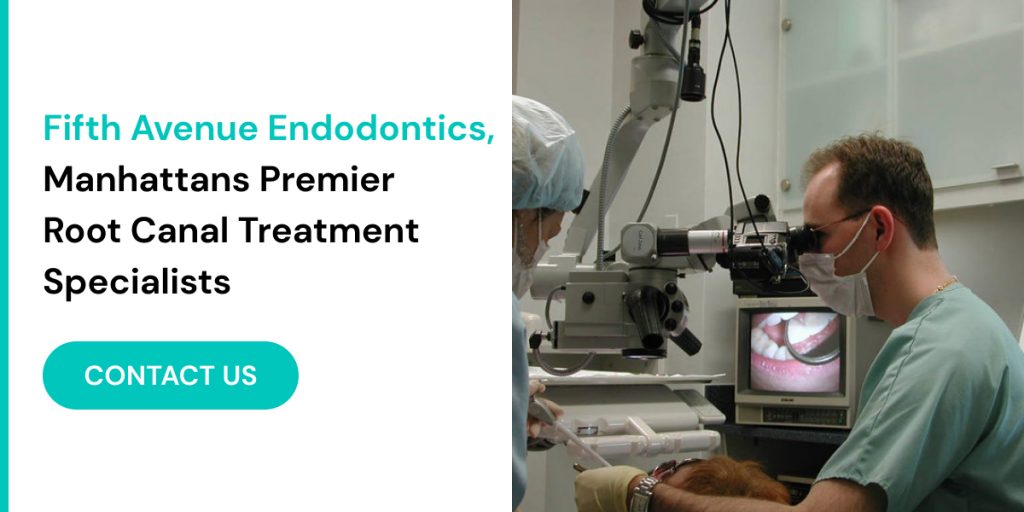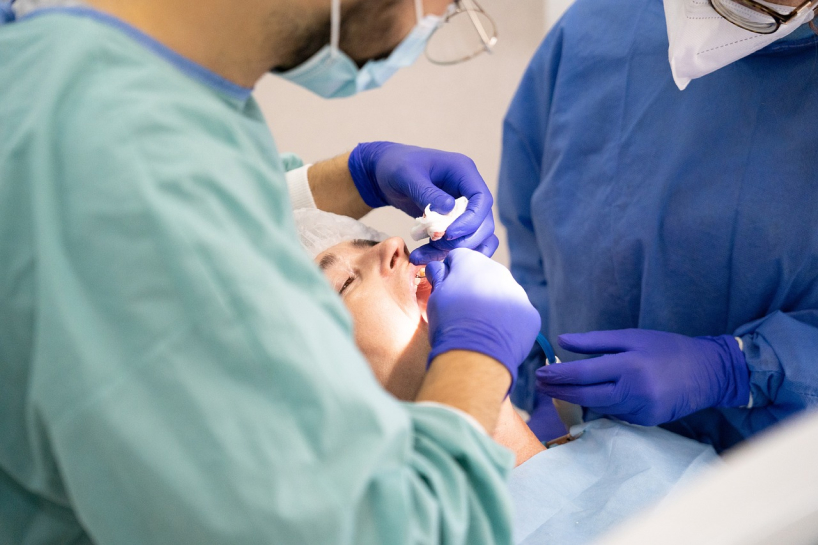When it comes to post-treatment care following endodontic procedures, the primary focus has traditionally been on managing pain and preventing infection. These are crucial aspects of recovery, but recent research is highlighting the potential benefits of incorporating probiotics into the healing process. Probiotics, known for their positive effects on gut health, are now being explored for their role in supporting recovery after Manhattan endodontic therapy.
At Fifth Avenue Endodontics, where Dr. Iofin and his experienced team in Manhattan, New York, offer exceptional root canal treatments, the integration of holistic approaches to recovery, such as probiotics, is gaining significant attention. The aim is not only to manage the immediate symptoms but also to enhance overall healing and well-being. Probiotics might contribute to a more comfortable and efficient recovery by potentially boosting immune function, reducing inflammation, and promoting a balanced oral microbiome. This evolving perspective underscores the commitment of Dr. Iofin and his team to providing comprehensive care that goes beyond traditional treatment methods, embracing innovative strategies to improve patient outcomes.
Understanding Endodontic Therapy
Endodontic therapy, more commonly known as a root canal, is a specialized dental procedure designed to salvage a tooth that has been severely damaged or infected. This essential treatment addresses issues within the tooth’s pulp—the soft tissue containing nerves and blood vessels located in the central part of the tooth.
During endodontic therapy, the process begins with the removal of the infected or damaged pulp from inside the tooth. This step is crucial as it eliminates the source of infection and alleviates any associated pain. Once the pulp is removed, the root canals, which are the pathways within the tooth’s roots, are meticulously cleaned and disinfected to remove any remaining bacteria and debris. The aim is to prepare the tooth for the next stage of treatment.
After the cleaning process, the empty root canals are filled with a biocompatible material called gutta-percha. This material seals the canals and prevents future bacterial infiltration. The final step typically involves placing a crown or permanent filling over the tooth to restore its functionality and protect it from further damage.
Recovery from endodontic therapy can be multifaceted. It often involves managing post-procedure discomfort, which may include mild to moderate pain and sensitivity. Effective pain management is crucial during this period to ensure a smooth healing process. Additionally, maintaining excellent oral hygiene is vital to prevent any potential complications and to support the healing of the treated tooth.
Overall health and follow-up care are also important components of the recovery process. Regular check-ups with your endodontist, such as Dr. Iofin at Fifth Avenue Endodontics in Manhattan, New York, ensure that the tooth is healing properly and that no issues are developing. By adhering to these recovery guidelines, patients can expect to return to normal function and comfort relatively quickly.
What Are Probiotics?
Probiotics are live microorganisms, commonly known as “good bacteria,” that are essential for maintaining a healthy balance of microorganisms in the gut. These beneficial bacteria, which include strains such as Lactobacillus and Bifidobacterium, contribute significantly to various aspects of health by promoting a harmonious microbial environment in the digestive system.
The gut microbiome, a complex community of bacteria and other microorganisms, plays a critical role in overall health. It influences digestion, immune function, and even mental well-being. When the balance of these microorganisms is disrupted, it can lead to various health issues, including digestive disorders, weakened immunity, and inflammation.
Probiotics help restore and maintain this balance by replenishing beneficial bacteria that might be diminished due to factors such as antibiotic use, poor diet, or stress. They work by outcompeting harmful bacteria for resources, producing substances that inhibit the growth of pathogens, and enhancing the immune system’s response.
While the benefits of probiotics for digestive health are well-documented, recent research is uncovering their potential advantages beyond the gut. Emerging studies suggest that probiotics may play a supportive role in recovery following various medical procedures, including endodontic therapy. For example, they might help modulate the immune response, reduce inflammation, and prevent secondary infections, which are all crucial aspects of the healing process.
In the context of endodontic therapy, incorporating probiotics into your post-treatment care could complement traditional recovery strategies. By fostering a balanced gut microbiome, probiotics might enhance overall health and potentially improve recovery outcomes. This holistic approach aligns with the comprehensive care philosophy practiced by Dr. Iofin and his team at Fifth Avenue Endodontic in Manhattan, New York, who are increasingly exploring the benefits of integrating such innovative strategies into patient care.
The Connection Between Probiotics and Endodontic Recovery
Recovery after endodontic therapy involves managing inflammation, promoting tissue healing, and preventing secondary infections. Here’s how probiotics could play a supportive role in this process:
1. Boosting Immune Function
Probiotics are known to modulate the immune system by enhancing the production of antibodies and promoting the activity of immune cells. A robust immune response is crucial for combating any residual infection and aiding in tissue repair. By incorporating probiotics into your post-treatment regimen, you may help bolster your immune defenses, potentially improving your recovery outcomes.
2. Reducing Inflammation
Inflammation is a natural part of the healing process but can sometimes become excessive, leading to prolonged discomfort and delayed recovery. Certain probiotic strains have been shown to have anti-inflammatory effects, which might help reduce the inflammation associated with endodontic therapy. This can lead to a more comfortable recovery period and a quicker return to normal activities.

3. Promoting Oral Health
Maintaining oral health is critical after a root canal procedure. Probiotics can contribute to a healthier oral environment by supporting a balanced oral microbiome. This balance can help prevent the overgrowth of harmful bacteria that might contribute to infections or complications. A healthy oral microbiome can, in turn, support the healing process and reduce the risk of post-treatment issues.
4. Enhancing Gut Health
The gut and oral health are interconnected through what is known as the gut-oral axis. Probiotics can support gut health by maintaining a balanced microbiome, which indirectly influences oral health. A well-functioning gut may contribute to better overall health and recovery, including faster healing after endodontic procedures.
Integrating Probiotics into Your Recovery Plan
Incorporating probiotics into your recovery plan after endodontic therapy can be a beneficial strategy to support healing and overall well-being. However, it’s crucial to approach this addition thoughtfully to maximize its potential benefits. Here are some comprehensive guidelines to help you integrate probiotics effectively into your post-treatment regimen:
- Consult with Your Endodontist
Before introducing any new supplement, including probiotics, into your recovery plan, it’s essential to consult with your endodontist. Dr. Iofin and his team at Fifth Avenue Endodontics in Manhattan, New York, can offer personalized advice based on your specific treatment and recovery needs. Your endodontist can assess your overall health, review your medical history, and consider any potential interactions with other medications or treatments you may be undergoing. This personalized consultation ensures that probiotics are a safe and appropriate addition to your recovery strategy.
- Choose Quality Probiotics
The effectiveness of probiotics largely depends on the quality of the supplements you choose. Not all probiotics are created equal, so selecting high-quality products is crucial. Look for probiotic supplements that contain well-researched strains, such as Lactobacillus and Bifidobacterium. These strains have been extensively studied and shown to offer various health benefits, including supporting gut health and modulating the immune system. Ensure that the probiotics you select come from reputable brands that use rigorous quality control processes. Proper storage is also essential to maintain the efficacy of probiotics, as exposure to heat, moisture, or air can degrade their effectiveness. Check the label for storage instructions and expiration dates to ensure that you’re getting the most benefit from your supplement.
- Monitor Your Health
Once you begin incorporating probiotics into your recovery plan, it’s important to monitor your health and observe how you respond to the supplement. While probiotics are generally considered safe for most people, it’s possible to experience some initial digestive changes as your body adjusts to the new microorganisms. Common mild side effects might include gas, bloating, or changes in bowel movements. These effects are usually temporary and should subside as your body adapts. However, if you experience any persistent or severe reactions, such as abdominal pain or allergic symptoms, it’s essential to consult with your healthcare provider promptly. They can help determine whether the probiotic is suitable for you or if adjustments need to be made.
- Integrate Probiotics with Other Recovery Strategies
Probiotics should be considered a complementary approach to other essential recovery strategies, such as proper pain management, oral hygiene, and follow-up care with your endodontist. Maintaining good oral hygiene practices, including regular brushing and flossing, and adhering to any post-treatment care instructions provided by Dr. Iofin are critical for a successful recovery. Probiotics can support these efforts by promoting a balanced microbiome, which can enhance overall health and potentially improve your recovery outcomes.
- Be Patient and Persistent
As with any health intervention, the benefits of probiotics may take some time to manifest. It’s important to be patient and consistent with your probiotic regimen. Incorporating probiotics into your recovery plan is a proactive step toward enhancing your overall health and well-being, but it should be part of a broader approach that includes professional medical advice and comprehensive care.
By following these guidelines, you can effectively integrate probiotics into your post-endodontic therapy recovery plan, potentially supporting a smoother and more efficient healing process.

Conclusion
Incorporating probiotics into your recovery plan after endodontic therapy could offer several potential benefits that enhance your overall healing process. These beneficial microorganisms can support your recovery by boosting immune function, reducing inflammation, and promoting a balanced oral microbiome. By fostering a healthier internal environment, probiotics may help prevent secondary infections and support faster recovery from endodontic procedures.
At Fifth Avenue Endodontics, where Dr. Iofin and his skilled team in Manhattan, New York, are committed to delivering comprehensive endodontic care, integrating holistic approaches like probiotics is seen as a valuable complement to traditional recovery strategies. The goal is to provide patients with a well-rounded approach to healing that addresses not only the immediate effects of the procedure but also supports long-term health and well-being.
However, it’s important to remember that probiotics should not replace professional medical advice or treatment. They are best used as an adjunct to the care provided by your endodontist. Discussing any new health strategies, including the use of probiotics, with Dr. Iofin ensures that they are tailored to your specific needs and aligned with your overall recovery plan. This collaborative approach helps to maximize the effectiveness of your treatment and supports a smoother, more successful recovery.

